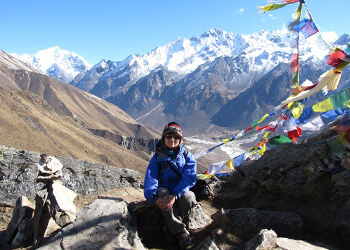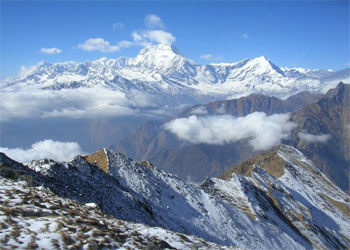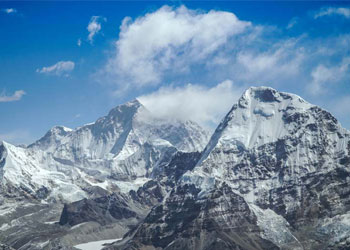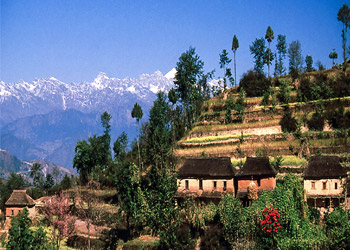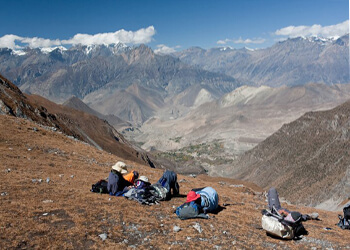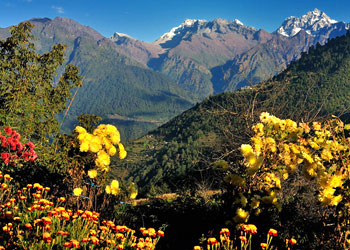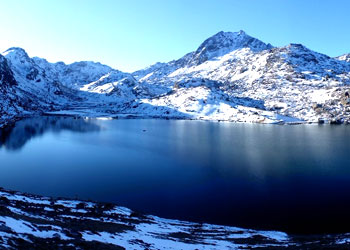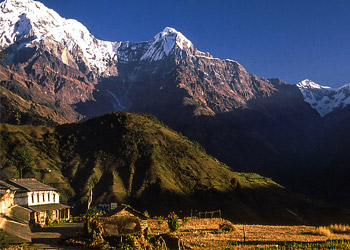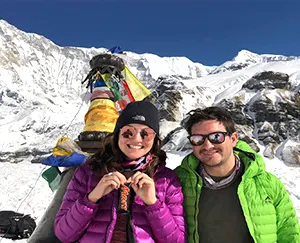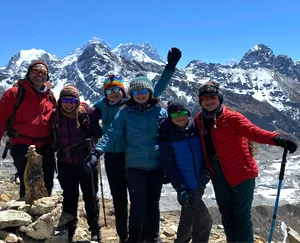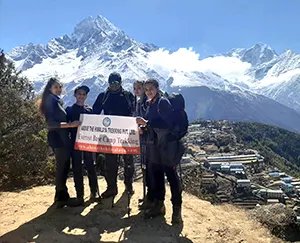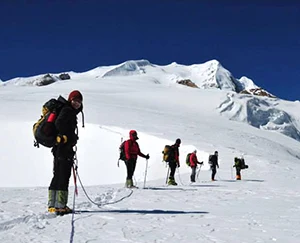Need Help? Let's Talk
+977 985-1095800
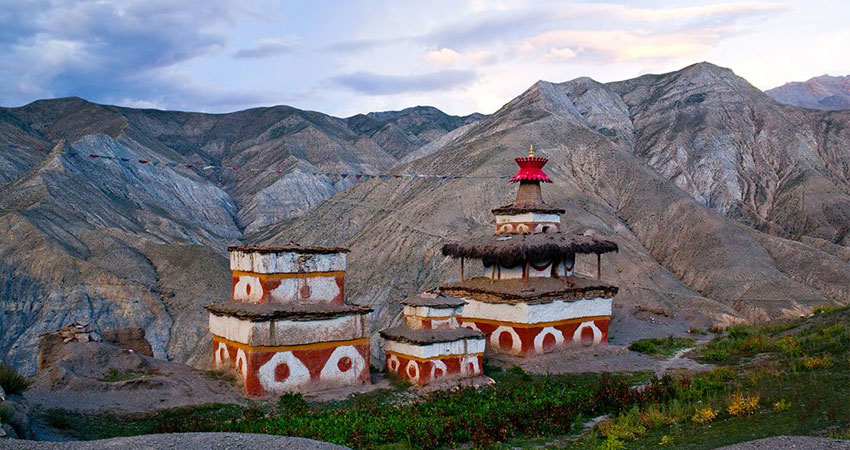
Highlights of Dolpo Trek
- Explore the Shey Phoksundo Lake and National Park in our Dolpo trek.
- Get astounding views of diverse landscapes.
- Learn cultural importance and religious practices in Nepal.
- Cross-high passes like Cang Mara La Pass (5,115 m), Nagdala La Pass (5,353 m), and Tyonta Pass (5,220 m).
- Explore the beautiful flora and fauna of Nepal.
Overview of Dolpo Trek
Dolpo Trek is an outstanding trek in a remote region of western Nepal. The entire district was not open to trekkers until 1990. It would help to have a special permit for Trekking in the Dolpo region. Dolpo lies inside the Shey-Phoksundo National Park in the mid-western.
It is behind the Dhaulagiri massif, towards the Tibetan plateau. During the summer, you will have an excellent opportunity to meet the nomadic natives and learn their way of life. You can also visit almost unaffected and unexplored places.
It also allows for meeting nomadic people and learning about their lifestyles. The warm welcome given by the Dolpo region is overwhelming. You get a fascinating insight into Tibetan life, making this an extraordinarily varied and unique trek.
The major attractions of the Upper Dolpo trek are wildlife and an ancient Buddhist monastery. There are beautiful lakes and a vast array of natural vegetation. The trail of begins with the flight from Nepalgunj to Jumla.
Then, the fantastic hiking begins. This area is a very famous hidden valley. In this trek, the trekkers get mesmerized by the charming villages, a land of mystery, scenery, peace, etc.
Shey Phoksundo National Park area is the inhabitant of various rare and endangered species. Wildlife includes snow leopards, blue sheep, goral, musk deer, and wolves. There are other wildlife and plant diversity.
Itinerary of Dolpo Trek
01
Day 01: Greetings at Kathmandu Airport,Transfer to your hotel
We will meet you at Kathmandu Tribhuvan International Airport. We will transfer you to your hotel for the Dolpo trek. You have time to settle in and freshen up after your long flight. We will invite you to visit our office for a briefing about your program.
You will meet with your trekking guide to discuss the equipment needed for the trekking. We will process the trekking permits. During this visit, we will help you check your equipment.
We will facilitate processing other necessary items such as National Park Permits, special permits, etc. If you arrive at night, we will have the same discussion the following day after breakfast.
02
Day 02: A full day sightseeing tour of Kathmandu, the capital valley
The following day of your Dolpo trek, you will leave for a full-day sightseeing tour around Kathmandu Valley after breakfast. You can visit the sacred Pashupatinath Temple and Swyambhunath. They are ancient and mostly enlisted in UNESCO World Heritage sites.
You will visit the biggest Buddhist Stupa at Boudhnath. Kathmandu Durbar Square’s fine arts and historical architecture reflect the ancient Nepalese culture. On return to your hotel, you will have time to explore the local area. Have dinner, and stroll through the famous streets.
03
Day 03: Kathmandu to Nepalgunj flight
Today, we will take a 1-hour flight from Kathmandu to Nepalgunj. We get a good view of the Himalayas to the north to start the journey. Nepalgunj is a small town near the Indian border in the Terai region of Nepal. You can look around the Bageshwari Mandir, a temple dedicated to Kali.
04
Day 04: Nepalgunj to Jumla by flight and trek to Gothichour
On the very morning, we take a flight from Nepalgunj to Jumla. We go over the Himalayan foothills, with views of Annapurna and Dhaulagiri peaks to the north. From Jumla, we cross the Tila Khola and Chaudabise Khola near their confluence.
Then, we climb gently to a fertile valley of rice terraces. The Dolpo trek trail continues through several villages. It passes through a forest of maple and walnut to a meadow. Beyond the field, the trail climbs to a rock cairn at Pattyata Lagna (2830m).
Then it descends into the magnificent alpine amphitheater. The trail descends past the project buildings at Gothichour to a stream at the bottom of the valley. Camping at night.
05
Day 05: Gothichour to Naphukana
Walk downstream through forests to a series of mills at Kuri Sangta. The trek follows the northern side of Tila Khola. It passes through fields of corn and potatoes. Then, it climbs through fields of buckwheat, barley, and attractive meadows, passing Tibetan Mani walls on the way.
The trail enters a forest of oaks, spruces, poplars, and maples. A short distance beyond Chotra (3010m) is the Tibetan settlement of Naphukana. The villagers keep large herds of yaks and horses — a campsite near the village.
06
Day 06: Naphukana- Mauria Lagna crossing to Balasa
The itinerary becomes steeper as it climbs past the rocky fields of Rapati Chaur. The route reaches forests of oaks and birch trees tangled with Spanish moss. After crossing a side stream, the trail crosses the Churta/Bapila/Tila Khola. Then, it starts a climb through birch, oak, and rhododendron forests.
Finally, reach Mauri Lagna’s” Honey Pass.” From the pass, view the snowy peaks of Gutumba, Matatimba, and Bhalu Himal. The trail makes a few ups and downs and passes side valleys and fields of corn and potatoes. Beyond the ridge is Balasa, the best place for our camping.
07
Day 07: Balasa to Hurikot
The Lower Dolpo trek trail descends a stream and climbs to the ridge in a forest of walnut trees. We pass villages inhabited by blacksmiths and tailors. The trail contours past the corn and potato fields and apple orchards to Hurikot. It climbs gradually through lots of thorn bushes to the campsite.
08
Day 08: Hurikot to Kagmara Phedi
Pass Hurikot and its Bonpo Gompa. Reach to a sign proclaiming the entrance of Shey Phoksundo National Park. The trail stays high above the river to the confluence where the Jagdula Khola and Garpung Khola join to form the Bheri.
The valley narrows. The river becomes a series of waterfalls as the Dolpo trek trail climbs to a moraine at 3900m. Make a high camp in boulders at Kagmara Phedi. Overnight stay camping.
09
Day 09: Kagmara Phedi to Pungmo crossing Kagmara La
The panoramic views of the peaks are sensational throughout the way. Wildflowers are a hardy alpine species. It includes blue poppies, buttercups, mint, gentians, and puffballs.
Climb alongside the Kagmara Glacier to the Kagmara La. Then descend about 900m along a stream to a campsite on pastures in the Pungmo valley. It is a fortress-like village with an atmospheric Bonpo monastery and apple orchards. Camping at night.
10
Day 10: Pungmo to Pungmo Gaon
The Dolpo trek trail now enters birch and juniper forests. You get an excellent view of Kanjirowa Peak on the way. You can see an amicable settlement of Tibetan villages with Yak herders. Spend your night in Pungmo Gaon.
11
Day 11: Pungmo Gaon to Phoksundo Lake
The Dolpo trek to Phoksundo Lake up the Suligaad is short, but it boasts many varieties. There are lovely forested sections, dramatic Phoksundo Lake, and a tiny pocket of the unique Bonpo culture. The lake is within Shey Phoksundo National Park, established in 1981.
The lake and the trail are snowbound from mid-November to mid-May. You can see majestic views of the snowy peaks of Kanjirolba Kagmara and Batrasi Himal. Visit nearby villages and Ringbo Gompa.
12
Day 12: Rest day
Today is rest and acclimatization day on our Dolpo trek. Admire the beauty of this place. Have a majestic view of the snowy peaks known as Kanjiroba Kagmara and Batrasi Himal.
13
Day 13: Phoksundo Lake to Shyanta
From here on, we will trek downhill toward Shyanta. We will follow the Dolpo trek trail of Chepka and move along the rocky terrains. Explore the medicinal plants in this area. We will reach the beautiful village of Shyanta.
14
Day 14: Shyanta to Jhupal
Today, we march on a path lined with birch trees towards Jhupal via Sulighat. From atop a ridge, we have fantastic mountain views above us and Jhupal Village below.
While hiking this trail, we recommend being extremely cautious. After arriving in Jhupal, we can relax or spend the afternoon touring the bustling market town. Sleep in Jhupal tonight.
15
Day 15: Fly to Nepalgunj, fly to Kathmandu
We travel to Nepalgunj on the first available flight from Jhupal. After arriving in Nepalgunj, we take the next flight back to Kathmandu. When we get to Kathmandu, someone will take us to our accommodation. There is nothing to do. Organize the images and exchange emails with travel partners.
We’ll have a farewell meal hosted by Above the Himalayas to commemorate the success of our Dolpo trek trip. Spend the night in Kathmandu.
16
Day 16: Final departure
Your 16-day Dolpo trek trip successfully ends today. So, you’ll be returning home after a long, exhausting, and excellent trek. Today, according to your scheduled flight, we’ll drive you to the Tribhuwan International Airport.
Trip Extension
Suppose you have more time in Nepal after this trip. In that case, we can help you to extend your trip by running different treks in Nepal, tours in Bhutan and Tibet, Jungle safari tours at Chitwan, Bardia, and other National parks, Nepal luxury hotel booking, Rafting, Ultra-light flights, or any other travel-related services. You can get more information here.
Dolpo Trek Cost Cover
What's Included?
- Airport / Hotel / Airport transfers by private vehicle.
- Four nights accommodation in Kathmandu on a twin sharing bed and breakfast basis.
- Guided Tour of Kathmandu City with expert tour guide and private vehicle
- Government license holder experienced, trekking guide (trained in Wilderness First Aid& altitude sickness) and porters (1 porter for between 2 trekkers basis) with their food, accommodation, salary, equipment, accidental insurance, clothing, and medicine.
- Round Trip flight ticket for Kathmandu Nepalgunj Kathmandu.
- Flight Ticket from Nepalgunj to Jumla back to Nepalgunj from Jhupal.
- All meals during trekking three meals a day (Breakfasts, Lunches, and Dinners)
- Twin sharing Lodges, Guesthouse accommodations during the trekking on local tea houses.
- Permit for Dolpo Trek.
- Trekker’s information management system (TIMS) card.
- Group medical supplies (first aid kit will be available).
- Above the Himalaya duffel bag. ( If you need, please let us know before you book the trip and remind us in our pre-meeting at our office)
- Comprehensive pre-departure information and trip dossiers
- Above the Himalaya Gifts (T-shirt for Gents & Pashmina shawl for Ladies, Trekking certificates)
- Welcome/Farewell Nepali Dinner in Kathmandu
- All necessary paper works, office Service charges, and all Government Taxes
What's Excluded?
- Lunch and dinner in Kathmandu.
- Nepal entry visa fee, you can get a Nepal visa upon arrival in the Airport.
- International Airfare/Airport tax, City tour Sightseeing entry fees.
- Alcoholic, hot and cold drinks, hot water, hot and cold showers.
- Personal expenses such as laundry, telephone calls, sweets, snacks, beverages and bar bills, camera battery charging.
- Travel Insurance (Essential – Should include emergency evacuation coverage while trekking up to 5500+ meters).
- Personal trekking gears
- Tips for tour/ trekking staffs and driver
- Any others expenses which are not mentioned on Price Includes section.
Dolpo Trek offers the best wildlife viewing.
The Nepal Lower Dolpo trek route goes through the ancient Tibetan salt caravan trail. The trail goes through high passes like Numa La (5190m), Baga La (5070m), and –La (4800m) and other very distant areas of the country. You will experience the high-altitude tundra, rock, and microclimate of Lower Dolpo. You will feel the cold air of the glaciers of Kanjiroba in the Phoksundo.
The unbounded diversity of this area makes it a destination to visit over and over again. Dolpo Trek Himalayas offer various landscapes, cultures, and great people. Time has stood still here for centuries as inhabitants of Tibetan stock continue to live. They cultivate and trade the way they have done for hundreds of years.
The people here are charming by nature. They are of Tibetan descent. They follow the pre-Buddhist Bon religion. In summer, the caravans of Yaks and sheep run through this valley. You are on a trade route through the Himalayas. The Oscar-nominated Film
‘Caravan’ showcased the Dolpo trek region of Nepal in all its integrity and mystical experience. The best time for the Dolpo trek here is from the end of the monsoon season, from September to November. It becomes more and more fascinating with every time you return.
Best Time
The best time for this trip is in the autumn (September–December). If we choose, October and November are best. During this time, the skies are more transparent, and almost no rain, so the visibility is high. Another good time to visit is during the spring season(March-May). This season is also the flower blooming season. So, enjoy the rhododendron flowers along the trail.
In your Everest trekking this season, you can enjoy the clear views of the spectacular peaks. Monsoon is not a good time to visit as the visibility is poor, and flights get canceled and delayed a lot. Winter is okay for the Dolpo trek in the lower part. The upper part is where the snowblocks occur. It is snowing and very cold, and high passes.
What to pack
The hiking is challenging, so you need the proper equipment to succeed on this trip.
During the trip, you will sleep in the tea house and have a basic homestay and eat there, so you need to carry your belongings, which are enough for the cold. Below are some suggested items to take while you do your trek.
- Walking boots are waterproof and have ankle support.
- Trainer or casual shoes you can use after a day trek.
- Hiking Shorts (3): Quick drying type, not cotton!
- Trekking Pants (3): preferably, they zip on/off at the knees, so you can also use them as shorts.
- Loose, casual trousers for trekking
- Thermal wear for colder areas
- Lightweight underwear – Capilene or other synthetic.
- Cotton pants or (loose jeans/khakis).
- T-shirts: Cotton for lower altitude walking. The synthetic is good above 2500m.
- Thermal Underwear: Synthetic polypropylene
- Waterproof Jacket. Quality waterproof clothing is essential. We recommend a proofed nylon or Gore-Tex jacket.
- Fleece jacket or pullover.
- Fleece Wind-Stopper jacket (optional).
- Goretex or warm jacket for winter trekking. Bring a down jacket.
- women sports bras, Synthetic
- Strong rucksack or large holdall to be carried by porters
- Daysack is used to carry valuables such as passports, cash, cameras, and travel documents.
- Plastic bags or stuff sacks to store
- Plug adapter 2 round pin
- Trail Map/Guidebook
- Journal & Pen, Pencils, and small notebooks
- Extra contacts or glasses
- Quick-drying towel (medium-sized)
- Toothbrush/paste (preferably biodegradable)
- Multipurpose soap/handwash
- Deodorants
- Nail clippers
- Face and body moisturizer
- Feminine hygiene products
- Small mirror
- Wet wipes
- Sanitizers
- Water purification tablets or iodine
- Refillable Water bottles
- Wool or fleece hat, or balaclava
- Hat or cap for sun protection while trekking
- Sunglasses or goggles
- Warm gloves
- Towel
- Sun lotion
- Lip balm
- Sunglasses protect from day sunlight.
- The sleeping bag must have a -20 degrees Celcius rating. You can also get a sleeping bag liner.
- Extra pairs of T-shirts and also shorts.
- Trekking pole
- Camera
- Flashlight and battery
- First aid kit (with moleskin for blisters)
Reviews on Dolpo Trek
Posted onVerified Thank you for the best tour we have ever had! I planned to stay at the Everest View Hotel this time and travel there because I wanted to see Everest, the highest mountain in the world, slowly, but despite the short schedule due to my children's school, all I got was a response that it was difficult to contact several tour companies. The Himaraya Trekking, Above, has worked out a smooth and safe schedule and had the best experience for me and my family. I will never forget the view of Mount Everest. Thank you very much.Posted onVerified Another Amazing Trip with Above the Himalaya This is my 3rd trip with Above the Himalaya and Puru. Each trip with Puru has exceeded expectation with the quality of the guides, porters and attention to detail. We were a team of 5 trekker and our ages were all above 67 years of age with the oldest being 73. We are all experienced hikers and trekker and our plan was to trek up the Khumbu Valley to the Cho La pass to Gokyo to the Renjo La pass to return to Lukla. However, the weather altered our plans as Cyclone Montha blanketed the country in rain at lower elevations and significant snowfall at the upper elevations. Due to the weather, no one was trekking and everyone was staying put in their current location during the storm. All the passes were closed due to the deep snow. We were in Namche when the storm was blanketing the country.This is where Above the Himalaya really shines is in the ability to adapt to the changing conditions and our safety. In conversation with our lead guide, we decided to alter our route to trek through the Gokyo valley to reach Gokyo and then do the Renjo La pass. Sitaram our lead guide and Dhurba our assistant guide was both attentive to the changing conditions and always kept a keen eye for how we were doing and feeling on the trek. The pacing was excellent as none of us had any hint of altitude sickness as we reached a maximum elevation of 5,365m.Having trekked and hiked all over the world with different tour companies, Puru’s company is simply the best. The communications, focus on safety, the guides and staff, the accommodations, and the food are all amazing. All you have to do is focus on the beauty of the mountains, enjoy the joyfulness of the Nepali people and have fun exploring the trails. I am planning my next trip with Puru for 2027 as there is no other trekking company to match Puru’s level of service.Posted onVerified Take a small step into the Himalayas I went with Above The Himalaya Trekking’s Everest View Hike in November 2025 and can only recommend with my whole heart!I had never visited Nepal or the Himalayas before and had a life long dream of seeing Mt Everest. I had though, hiked a lot in various parts of the world, but never above 2000 m, so I went with the five day Everest View Trek to take a small step and see how I would handle the altitude. From first enquiry about dates and various questions, to my arrival back from the trip, Puru has been an invaluable help, always standby on mail and WhatsApp, pulling strings and making things happen.Also big shout out to the amazing guide I was teamed with, Kamal, who did everything he could to answer all my curious questions about vegetation, animal life, Nepalese culture and everything in-between :) Kamal was the perfect gentleman, offering little treats and reminding me to take breaks, and all in all I felt very safe and in good hands all the time. He also had good banter and jokes, which lifted the spirit of even the hardest climb.It was cold most nights and mornings and even though the tea houses provided heavy blankets (and I could borrow extra) I was glad I had the sleeping bag with me, which I rented through Puru. But I could definitely have survived without and saved the space in my pack.In total, I’m very pleased I’ve got to experience this lovely country with Above the Himalaya Trekking and if I ever come back for the big leap into the mountains, I’ll chose Kamal and Puru all over again :)Posted onVerified Nepal trek-Gokyo Second trek with Above the Himalaya, this time to Gokyo and over Renjo La. Our lead and assistant guides (Sitaram and Dhurba) were excellent. Due to several days of rain at lower elevations and snow higher we needed to change our plans while in the midst of our trek. Above the Himalaya accomplished this smoothly and flawlessly, which ultimately resulted in a better experience. We’ll be back!Posted onVerified Great Experience and Friendly people. We had a great time with Above the Himalayas tour company in Oct. Ajay, the tour guide in Kathmandu is very friendly and knowledgeable. He took us to a lot of places that we can experience local authentic daily life. Puru, the owner, arranged and organized our trip in such way that we really feel comfortable and enjoyable. We are specially impressed by his quick action and management skills. Our flight to Pokhara got cancelled due to bed weather. Within minutes, Puru was able to arrange a car and a driver to drive us to Pokhara! It saved out trip.Posted onVerified Glorious trekking experience - ABC We had the most wonderful experience doing the Annapurna Base Camp trek with our fabulous guide, Tanka, and porter, Ravi. The trek was glorious, despite some rainy days, and although we weren't sure we would get to see the peaks at ABC, the weather cleared just in time and we had an amazing sunrise there. What made the whole trip so special, though, were Tanka and Ravi, who remained cheerful at all times and went out of their way to make everything as good as it could be. This included setting a pace with regular breaks which made the walking completely manageable, modifying the itinerary so we could visit additional villages, getting up in the middle of the night to see if the sky would be clear for sunrise, and bringing a sense of ease and humour to all our interactions. We just loved the whole thing and are keen to return to Nepal for another trek. It was magical!Posted onVerified Above the Himalayas goes above and beyond expectations! From start to finish everything was perfect! Puru, the managing director, was always quick with his responses to my questions when I first contacted him about planning our trek, and he continued to check to see that everything was going well throughout.Our guide Tanka and porter Ravi were fantastic! Their friendly demeanor kept our experience lively and interesting the entire time and made sure that we were well taken care of. Even small details like Ravi coming in and double checking our rooms to see that we had left nothing behind before leaving each morning, and seeing that meals were prepared the way we liked them weren't overlooked. Tanka was also quite knowledgeable about the mountains, the people, and just about everything "Nepal". He enthusiastically shared stories about his family and Nepalese life in a general way.Although there was a clear itinerary each day, and for the whole trek, Tanka allowed for flexibility in terms of time and where to stay. He was even willing and able to make changes to same-day accommodation based on how far we anticipated hiking that morning. I can't say enough about how much we enjoyed our hike and I would definitely recommend Above the Himalayas for anyone considering a trek.Posted onVerified Amazing tour For me and my son, Pru thought of a four-day trekking tour.His interaction was very smooth.On the first day, I went with my son to Gandrouk, and on the second day, he went to a higher place (mulde view point, Poon hill) with his guide Ashok. Ashok was very kind and took me to various local places. The food was also very good.My guide, Tangka, was very kind and helped me a lot.I recommend this travel agency because it's great.Posted onVerified Everest Base Camp Trek My friends and I just completed the EBC trek. From the time I met Puru at the Canada Place trade show in Vancouver BC, Canada I felt comfortable going to Nepal. His communications via WhatsApp were seamless answering all our questions. Everything went exactly according to plan. Our guide Suresh was amazing. He took very good care of us the whole time. From guiding us to making sure we had everything we needed to be happy. The food the whole way up and back was amazing! 5 ⭐️. Our 2 porters were great as well. I have a whole new respect and appreciation for what they do. They are the true hero’s to what we can do as a team. We chose the basic trek the lodging was to be expected. If I was to do again I would choose the luxury trek. The hotels in Kathmandu at the Hotel Aloft and the Hotel Lo Mustang were top notch as well as the buffets. Highly recommend this local company!Posted onVerified Great tour, would recommend! My friend and I completed the 10 day Annapurna circuit with Above Trekking Himalaya. Buddha our porter was a little mountain goat, pocket rocket. When I got altitude sickness he carried my bag, as well as mine and my friend’s big pack. He was friendly and loved to played cards with us, always with a cheeky smile on his face. Sitaram our guide was very knowledgeable of the area and quite serious. He was always available if we had any questions and went above and beyond to try get us the best/quietest rooms in the tea houses. Puru was fabulous working behind the scenes to ensure our trip was as smooth as possible. He was very quick to respond to any messages. It was a great experience to see Nepal with some locals and I certainly appreciated their support when I succumbed to altitude sickness. They stayed close to us the whole time and checked in frequently making us feeling safe and supported the entire time.Verified by TrustindexTrustindex verified badge is the Universal Symbol of Trust. Only the greatest companies can get the verified badge who has a review score above 4.5, based on customer reviews over the past 12 months. Read more

Alex Morse
UK
Best Lower Dolpo trek
We had the best time in the Dolpo trek. We have visited the lower Dolpo area and Shey Pholsundo Lake. We did an essential tea house trek. It was much easier than Camping as we had one guide and one porter. We slept at the local house in some places, which was a fantastic experience.
Thank you, Above the Himalaya trekking, for the best Dolpo trekking.
Alex Morse
Book with Confidence
- Flexible bookings and easy trip date changes
- Personalized service and customized group sizes
- Safe travels with owner-operated services and highly experienced guides
- Best price guarantee for the most value for your money
- Secure & easy online booking
Your Trek Leader
 Enjoy Himalayan scenery with the help of Nepal’s best guides with Government license holders and got training in first-aid, our Trip Leaders, know where you’ll find the best photos, most fascinating wildlife, and the best stream crossings.
Enjoy Himalayan scenery with the help of Nepal’s best guides with Government license holders and got training in first-aid, our Trip Leaders, know where you’ll find the best photos, most fascinating wildlife, and the best stream crossings.
 Have Questions?
Have Questions?Talk to Expert
Meet Mr. Purushotam Timalsena (Puru), Nepal's best trek and tour organizer, who has been working in the Himalayas for more than 24 years.
WhatsApp/Viber +977 98510 95 800




